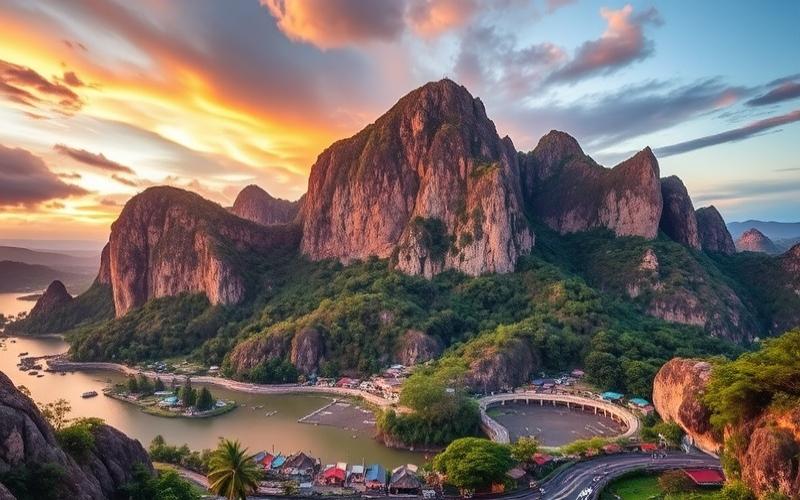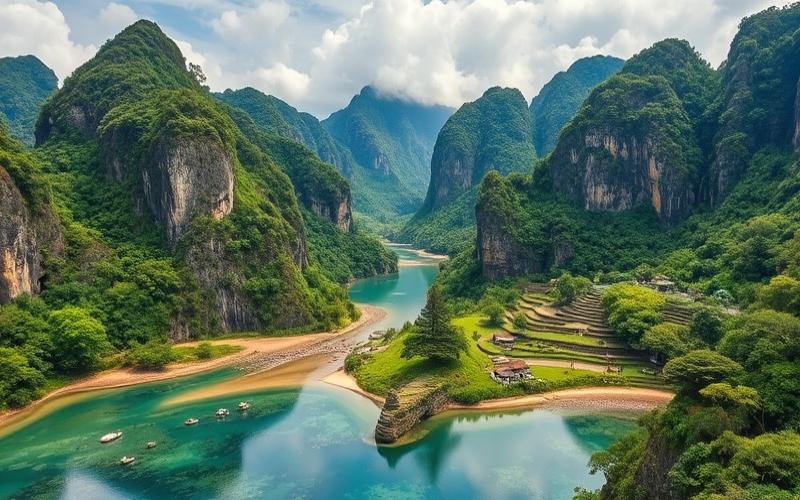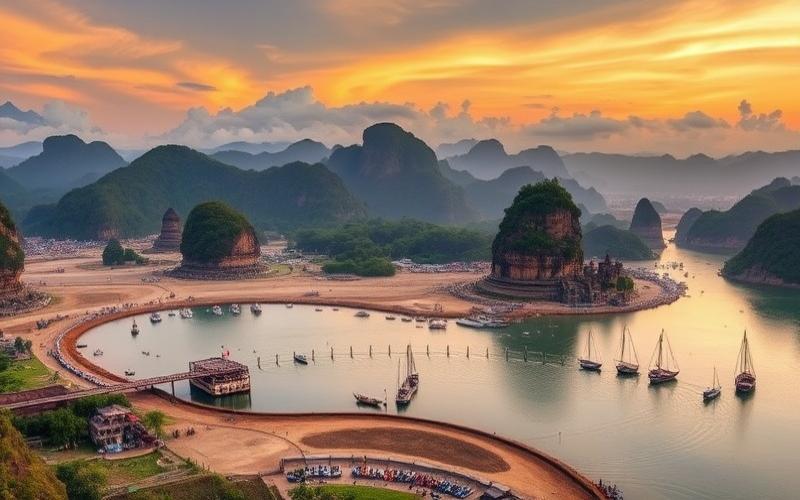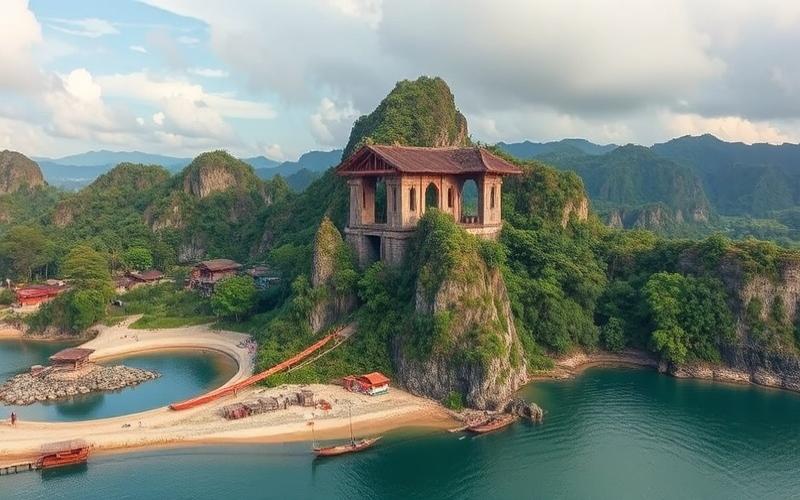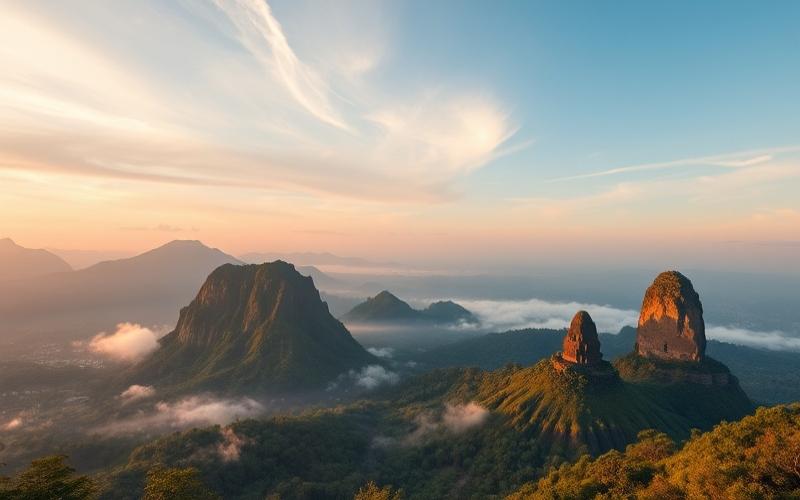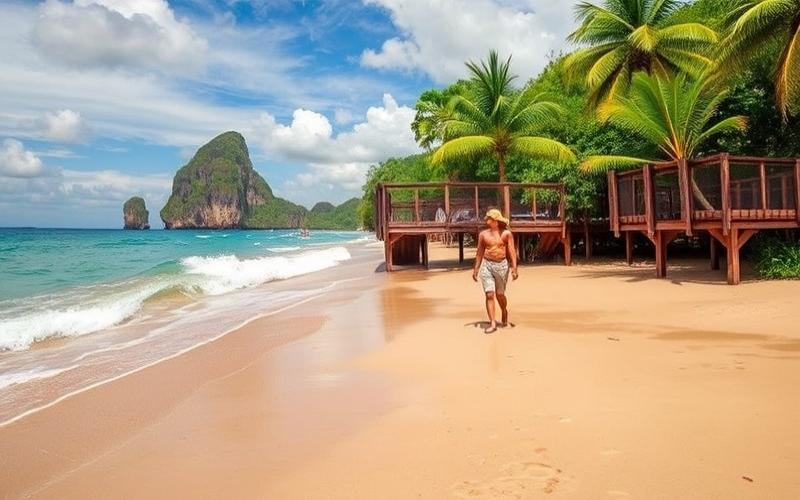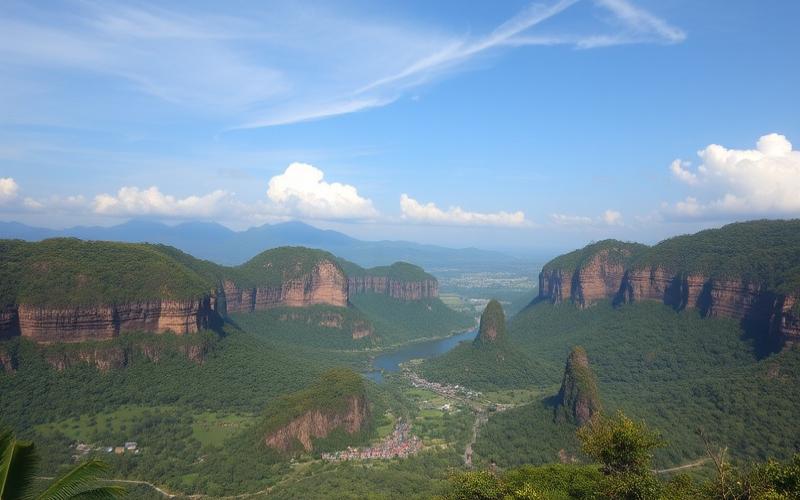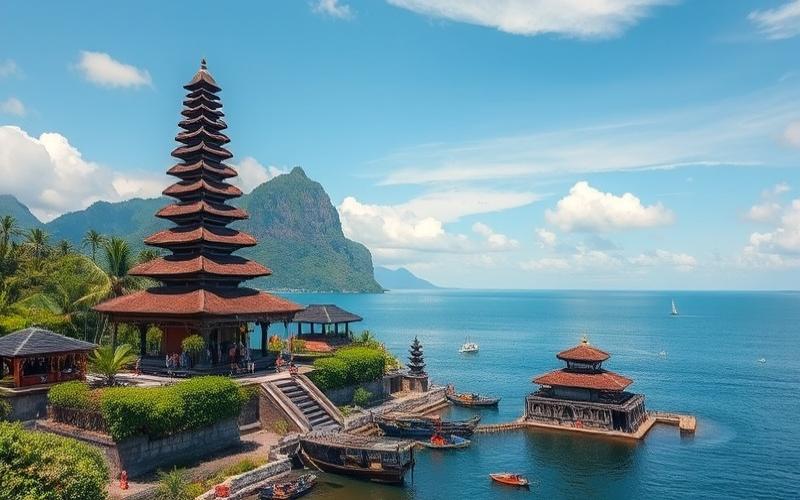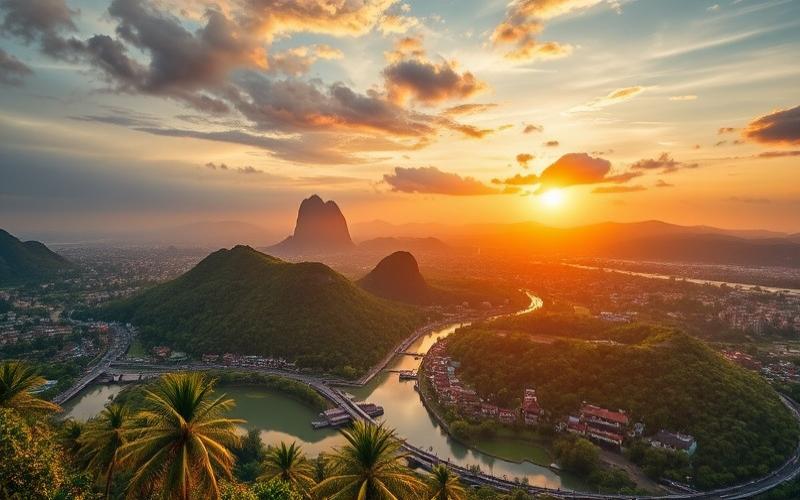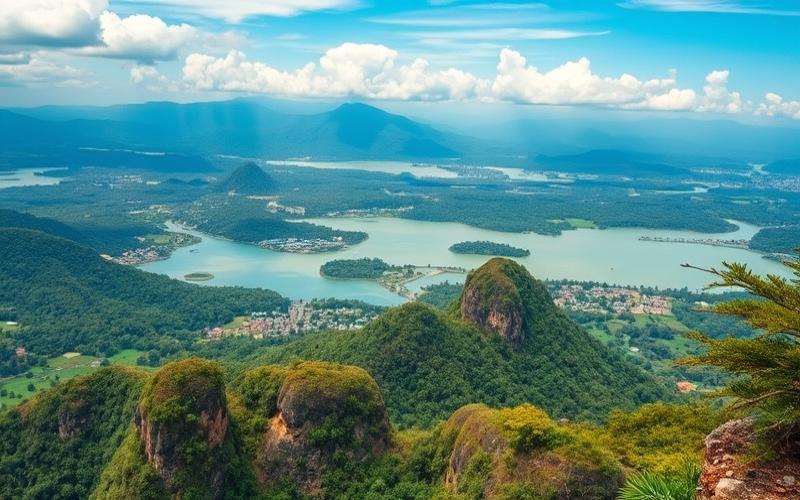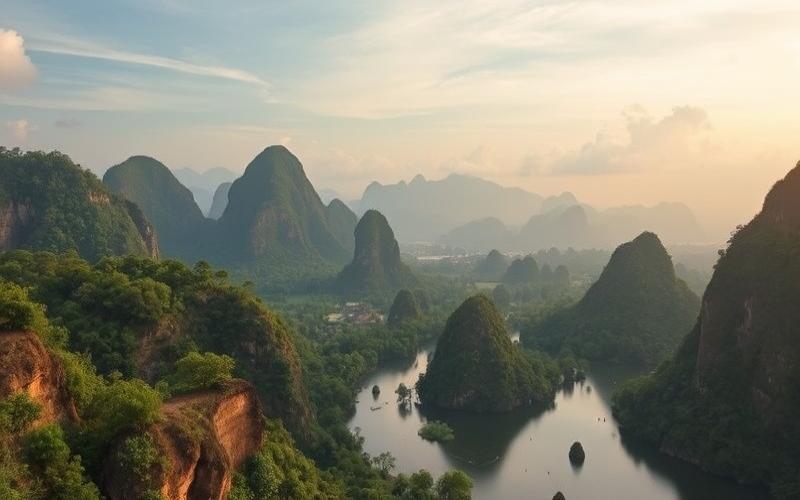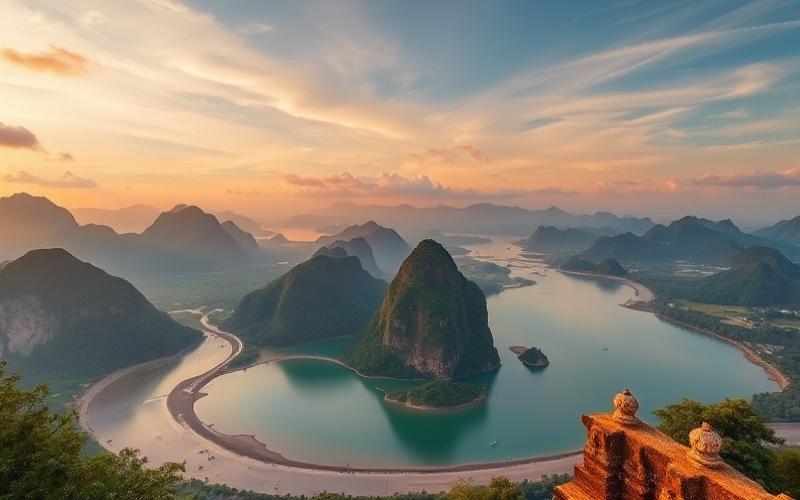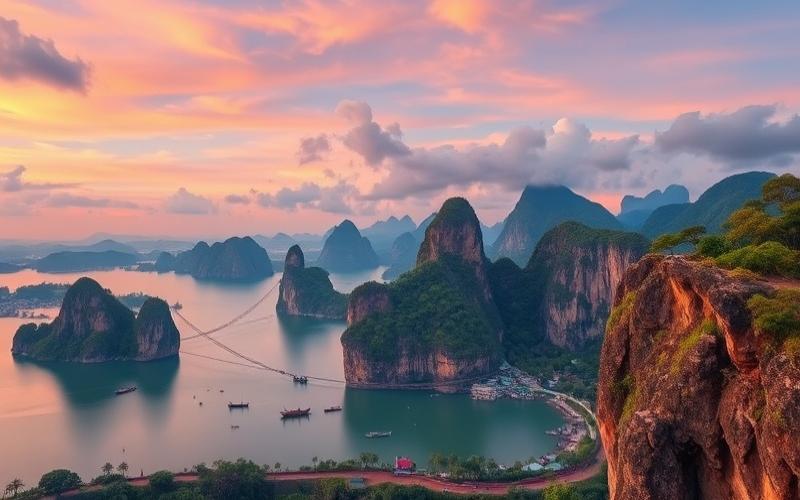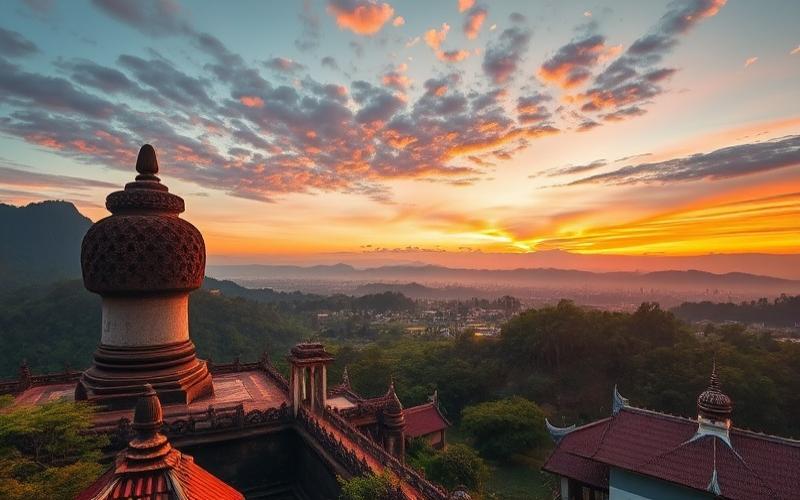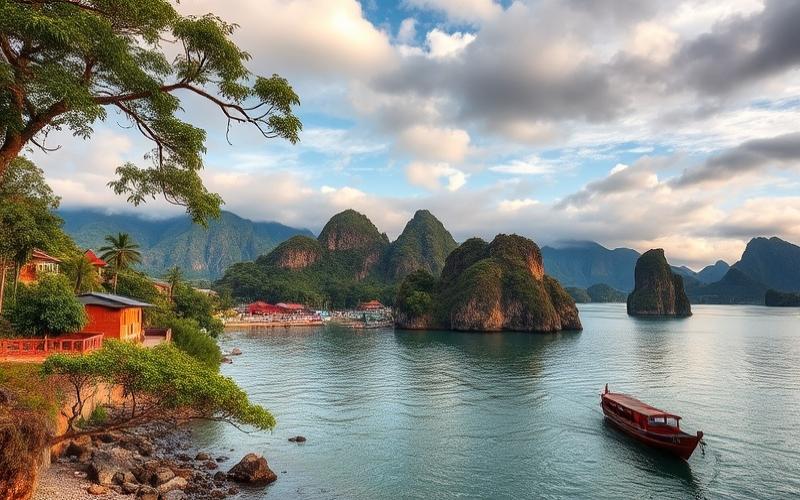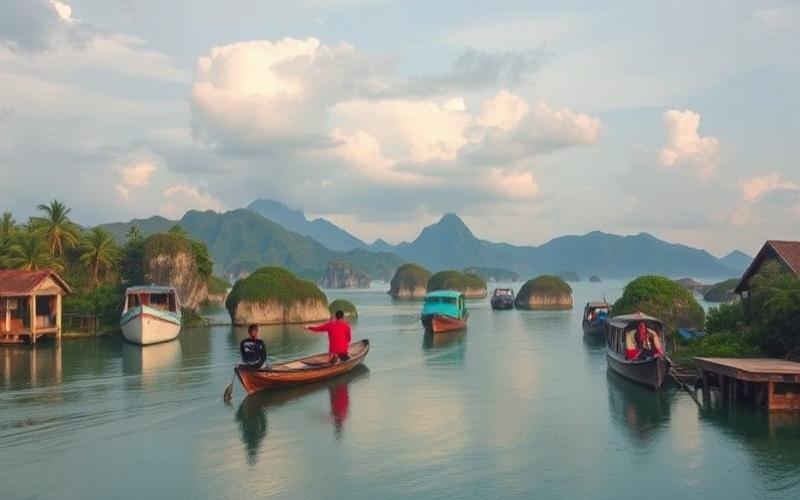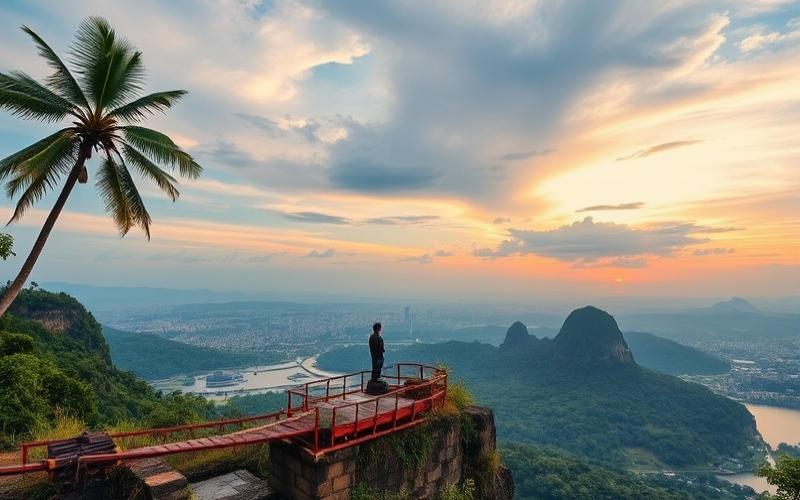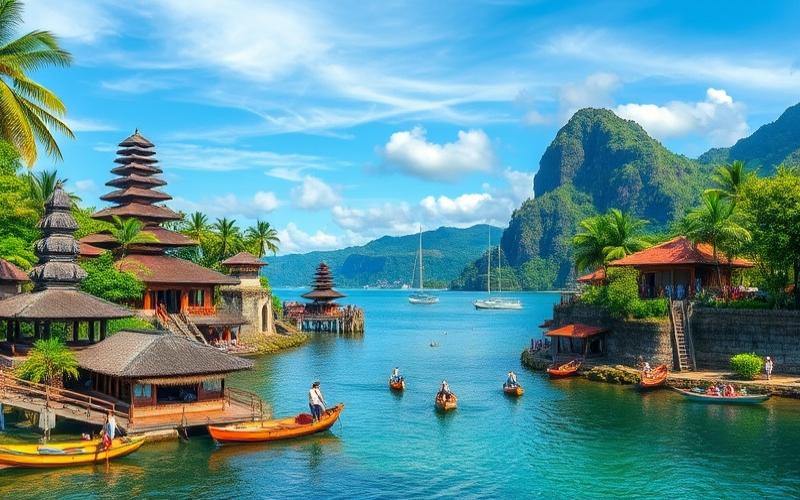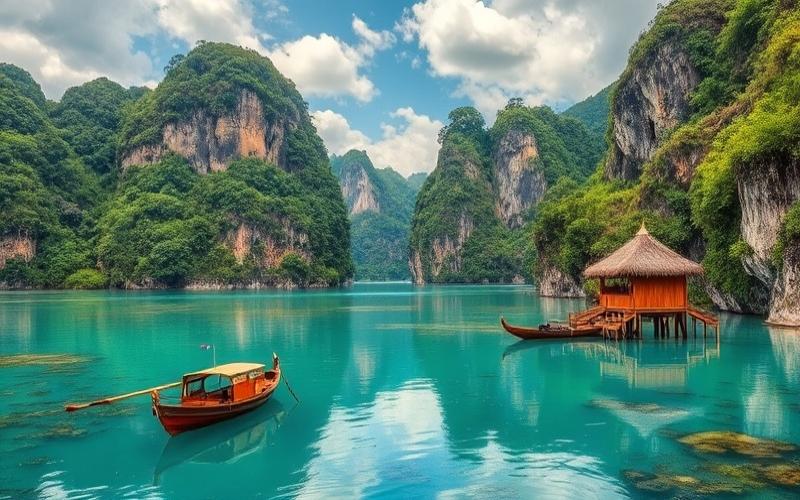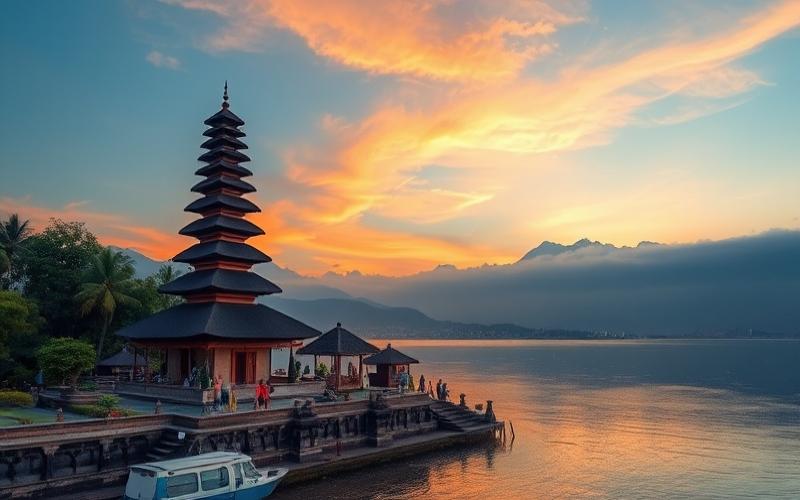
 Published on and written by Cyril Jarnias
Published on and written by Cyril Jarnias
Enchanting and diverse, Indonesia is a true treasure for travelers seeking wonder. Exploring this multifaceted archipelago reveals a mosaic of spectacular landscapes, ranging from Bali’s pristine beaches to Sumatra’s mysterious jungles.
Culture enthusiasts will be captivated by the exceptional heritage of Borobudur and Prambanan temples, while adventurers will be drawn to the breathtaking spectacle of active volcanoes, such as Mount Bromo or Kawah Ijen.
Whether diving into multicolored coral reefs or sharing a traditional meal with locals, every visitor is sure to find their bliss among the must-see tourist attractions of this colorful country.
Discovering Indonesian Wonders
Indonesia abounds with natural and cultural wonders, among which certain sites are absolute must-sees for travelers seeking unique experiences.
Bali
- Paradise beaches: Kuta, Seminyak, Jimbaran, renowned for their turquoise waters and sunsets.
- Cultural ambiance: Ubud, an artistic and spiritual center, offers Balinese dance performances, craft markets, and typical temples.
- Activities: Surfing, diving, cycling or walking through traditional villages and rice fields.
- Jatiluwih Rice Terraces: UNESCO World Heritage site, offering spectacular landscapes perfect for hiking or photography.
Borobudur Temple (Java)
- UNESCO World Heritage, this 9th-century Buddhist temple impresses with its stupas and carved bas-reliefs tracing Buddhist history.
- Cultural significance: Major pilgrimage site and symbol of Buddhist influence across the archipelago.
- Activities: Sunrise visit for a mystical atmosphere, garden exploration, and discovering local life in Yogyakarta.
Komodo National Park
- Natural habitat of the Komodo dragon, the world’s largest living lizard.
- Unique biodiversity: Pink beaches, mangroves, coral reefs.
- Activities: Island hiking, dragon watching, snorkeling and diving to discover marine life.
Raja Ampat (West Papua)
- Archipelago of over 1,500 islands, recognized for exceptional marine biodiversity.
- Diving paradise: Multicolored corals, tropical fish, turtles, manta rays.
- Pristine nature: Kayak excursions, Papuan village exploration, exotic bird watching.
| Site | Cultural and Historical Significance | Tourist Activities | Natural Features |
|---|---|---|---|
| Bali | Hindu tradition, Balinese arts, UNESCO rice fields | Surfing, diving, hiking, crafts | Beaches, terraced rice fields |
| Borobudur | 9th-century Buddhist temple, UNESCO | Sunrise visit, gardens | Stupas, bas-reliefs, panoramic views |
| Komodo | Komodo dragon habitat, UNESCO park | Hiking, snorkeling, diving | Unique wildlife, pink beaches |
| Jatiluwih (Bali) | UNESCO rice fields, Balinese agriculture | Hiking, cycling, photography | Terraced landscapes |
| Raja Ampat | Papuan villages, local traditions | Diving, kayaking, bird watching | Exceptional marine biodiversity |
Must-Do Activities in Indonesia:
- Scuba diving and snorkeling in the waters of Komodo and Raja Ampat.
- Hiking through Bali’s rice fields or Java’s volcanoes.
- Discovering temples and participating in local ceremonies.
- Exploring local life: markets, traditional villages, cultural performances.
Indonesian wonders offer harmony between heritage, nature, and adventure, inviting every traveler to immerse themselves in the archipelago’s fascinating diversity.
Good to Know:
Enjoy Bali’s paradise beaches before exploring Jatiluwih’s terraced rice fields, and don’t miss diving in Raja Ampat to discover its unique marine biodiversity. Visit Borobudur Temple at dawn to avoid crowds, and opt for a hike in Komodo National Park to spot the famous dragons in their natural habitat.
Practical Travel: How to Explore Indonesia
Indonesia, with its 17,000 islands scattered across a vast territory, requires careful planning to optimize travel. The choice of transportation depends mainly on distances to cover and available time.
Efficient Transportation Methods
Air travel stands out as the most practical solution for covering long distances between main islands. Several low-cost airlines offer regular flights connecting major cities across the archipelago, saving precious time given the considerable distances between some destinations. However, delays remain frequent due to weather conditions, requiring flexibility in scheduling, particularly during layovers.
Ferries provide an economical and eco-friendly alternative for inter-island connections. The national company Pelni handles main routes with a fleet of large ships following fixed schedules, typically 1-2 times per month. Sumatra, Java, Bali, Nusa Tenggara, and Sulawesi islands are all connected by regular ferries, allowing travel across the country from end to end. On busy routes like Java-Bali-Lombok-Sumbawa, crossings can be daily or even hourly. Fares vary significantly by class: economy class remains very affordable, while superior cabins can compete with low-cost flight prices. Note: Some crossings may span several days, requiring provisions.
Trains represent an interesting option on certain islands, although the railway network is limited. In Java, trains are very popular and easily connect Jakarta to Yogyakarta. Sumatra also has some lines. From Jakarta Airport, a high-speed train reaches the city center (Sudirman Baru station) in about an hour for 70,000 Rp, providing a fast and economical alternative to taxis.
Buses offer a cheap way to travel between cities within the same island. Inexpensive and easy to book, they generally depart on time, though journeys can be long. Different companies provide day and night services. Bemos (minibuses carrying about ten people) provide an authentic and very economical experience, with routes adaptable to passenger destinations.
Taxis are particularly advantageous for urban travel due to their low cost. Recommended companies include Blue Bird, Express, Taxiku, and Gamya. The GRAB app significantly facilitates taxi searches in major cities. It’s also possible to rent taxis by the day to explore surrounding tourist sites, with prices negotiated directly with drivers.
For short distances and countryside exploration, renting motorcycles or bicycles proves practical, though using these vehicles in cities is not recommended due to dangerous traffic. An international license remains mandatory for riding two-wheelers. Other picturesque options exist, like becak (cycle rickshaws), bajaj, or vespa taxis, mainly permitted on city outskirts.
Main Islands and Attractions
| Island | Must-See Attractions | Special Features |
|---|---|---|
| Java | Jakarta (capital), Borobudur and Prambanan temples, Yogyakarta, active volcanoes | Most populated island, developed infrastructure, railway network |
| Bali | Ubud, Hindu temples, terraced rice fields, southern beaches | Major tourist destination, high visitor concentration |
| Sumatra | Lake Toba, Bukit Lawang orangutans, volcanoes | Wild nature, some railway lines |
| Lombok | Paradise beaches, Mount Rinjani climb | Quieter alternative to Bali |
Climate and Ideal Seasons
Indonesia’s tropical climate divides into two main seasons. The dry season, extending from April to October, represents the optimal period to visit the archipelago, with favorable weather conditions and calm seas. The rainy season, from November to March, brings heavy rainfall that can complicate travel and certain activities, although temperatures remain pleasantly warm year-round.
To avoid tourist crowds, prefer the months of May, June, and September, which combine favorable climate conditions and moderate attendance. The Idul Fitri period (end of Ramadan) and major Indonesian holidays lead to considerable transportation crowds, particularly ferries that may be full even on decks and in corridors.
Accommodation
Indonesia offers accommodation options for all budgets. Luxury hotels concentrate mainly in Bali, Jakarta, and major tourist cities, offering high-end services and Western comfort. Mid-range hotels provide an excellent compromise, combining adequate comfort and reasonable rates. Hostels and guesthouses enable budget travelers to find economical options, often in authentic and friendly settings. Homestays with locals offer unique cultural immersion and very competitive rates.
Essential Practical Tips
Currency conversion: The Indonesian currency is the rupiah (Rp). ATMs are widely available in tourist areas and major cities. It’s recommended to exchange money at official offices or banks rather than on the street. Always keep small bills for local transportation and small purchases.
Health conditions: No vaccines are mandatory to enter Indonesia, but certain immunizations are strongly recommended (hepatitis A and B, typhoid, Japanese encephalitis for extended stays in rural areas). Tap water is not drinkable; prefer sealed bottled water. Prepare a medical kit with antimalarials if visiting rural areas, along with effective mosquito repellent and sun protection.
Visa formalities: Nationals of many countries can benefit from visa exemption for tourist stays up to 30 days, or obtain a visa on arrival. Passports must have at least 6 months validity after entry date. For longer stays or other visit purposes, check with the Indonesian embassy.
Transportation safety: Keep a watchful eye on your belongings, particularly during ferry embarkation and disembarkation where pickpockets operate. In taxis, verify that the meter is activated or negotiate the price before departure. Always plan flexibility in your schedule due to frequent delays. For Pelni ferries, book tickets a few days in advance at ticket offices or local agencies.
Good to Know:
Prefer domestic flights to quickly connect Java to Bali; choose ferries to discover Lombok and Sumatra at lower cost. Travel between May and September to avoid the rainy season and opt for cheap hostels for an economical stay.
Finding Perfect Accommodation in Indonesia
Accommodation Types in Indonesia and Characteristics
| Accommodation Type | Main Characteristics | Indicative Price Range (per night) |
|---|---|---|
| Hotels | All comfort levels, from basic to luxury, often well-located, varied services (pool, spa, restaurant) | 400,000 to 15,000,000 Rp |
| Villas | Private lodgings, often with pool and garden, perfect for families/groups, privacy, personalized services | 500,000 to 29,000,000 Rp |
| Hostels | Shared rooms/dormitories, common areas, friendly, suited for small budgets and socializing | From 100,000 to 350,000 Rp |
| Guesthouses | Family welcome, local immersion, variable comfort, breakfast included, good value for money | 150,000 to 500,000 Rp |
| Homestays | With locals, authentic experience, simple comfort, perfect for cultural immersion | From 80,000 to 250,000 Rp |
| Resorts | High-end amenities, often seaside, included activities (spa, sports, excursions) | 1,000,000 to 20,000,000 Rp |
| Cottages/Apart-hotels | Independent lodgings, often well-located, equipped kitchen, ideal for extended stays | 300,000 to 1,500,000 Rp |
Booking Tips
- High tourist season (July-August, December-January): Book 2-4 months in advance for best choices and rates.
- Low season (February-June, September-November): More flexibility, advantageous rates, last-minute bookings possible.
- Recommended platforms:
- Booking.com, Agoda, Airbnb, Hostelworld to compare prices and availability.
- Cozycozy, Expedia, Wego to find exclusive offers or unique accommodations.
- Tips:
- Check customer reviews to validate actual quality.
- Prefer establishments offering free cancellation.
Where to Stay by Tourist Sites
| Destination | Main Interest | Recommended Neighborhoods/Areas for Accommodation |
|---|---|---|
| Bali | Beaches, temples, surfing, rice fields | Ubud (culture, nature), Seminyak/Canggu (beaches), Jimbaran (quiet) |
| Yogyakarta | Javanese culture, Borobudur, Prambanan | City center, Prawirotaman, Borobudur village |
| Jakarta | Urban life, museums, shopping | Menteng, Sudirman, Kuningan |
| Lombok/Gili | Beaches, diving, tranquility | Senggigi (Lombok), Gili Trawangan (Gili) |
| Sumatra | Nature, volcanoes, orangutans | Bukit Lawang, Berastagi, Padang |
| Komodo/Flores | Diving, Komodo dragons | Labuan Bajo |
| Sulawesi | Diving, Toraja traditions | Makassar, Rantepao |
Cultural Aspects to Consider
- Prefer accommodations near local markets or traditional neighborhoods to facilitate cultural immersion.
- Ensure ecological sustainability: choose establishments committed to waste sorting, using local materials, limiting plastic.
- Some regions are more conservative (Java, Lombok): verify accommodation compatibility with local customs (respect for quiet, dress codes).
Recommendations by Budget
| Budget | Suitable Options | Additional Tips |
|---|---|---|
| Small budget | Hostels, homestays, guesthouses, simple guesthouses | Book in outlying neighborhoods |
| Medium budget | 2-3* hotels, modest villas, cottages, apart-hotels | Take advantage of off-season offers |
| High budget/luxury | High-end villas, resorts, 4-5* hotels | Prefer sea views or premium services |
Safety and Travel Management
- Check for safe, security guard or 24/7 security, especially in major cities and tourist areas.
- Prefer accommodations near transportation hubs (bus station, port, airport shuttle).
- Use transfer services offered by accommodation or pre-book reliable taxis (Blue Bird, Grab).
- Rent scooters or cars only with local driving experience.
- For distant visits, organize excursions with local agencies or guides recommended by accommodation.
Remember: Choosing accommodation in Indonesia should align with your priorities: immersion, comfort, budget, proximity to sites, and ecological values. Good accommodation will facilitate discovery and safety throughout your stay.
Good to Know:
Choose a villa in Bali to enjoy its beaches, while staying in Yogyakarta is ideal for visiting Borobudur; book off-season on platforms like Agoda for better offers. Consider choosing accommodation near local markets for a culturally enriching stay and ensure easy access to tourist sites to optimize your travel.
Disclaimer: The information provided on this website is for informational purposes only and does not constitute financial, legal, or professional advice. We encourage you to consult qualified experts before making any investment, real estate, or expatriation decisions. Although we strive to maintain up-to-date and accurate information, we do not guarantee the completeness, accuracy, or timeliness of the proposed content. As investment and expatriation involve risks, we disclaim any liability for potential losses or damages arising from the use of this site. Your use of this site confirms your acceptance of these terms and your understanding of the associated risks.

